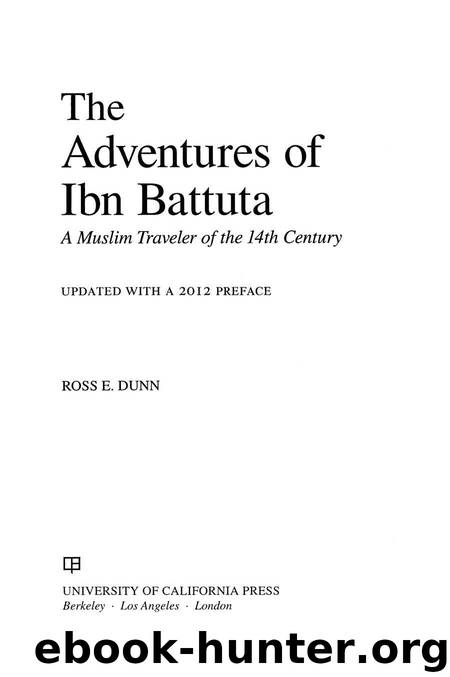The Adventures of Ibn Battuta: A Muslim Traveler of the Fourteenth Century, With a New Preface by Ross E. Dunn

Author:Ross E. Dunn [Dunn, Ross E.]
Language: eng
Format: azw3
Publisher: University of California Press
Published: 2012-06-01T04:00:00+00:00
Mongol holocausts or no, Khurasan–Transoxiana remained to the landward commerce of Afro–Eurasia what the Arabian Sea was to the monsoon trade: the complex crossroads of trails connecting all the major agrarian regions of the hemisphere with one another. Most of the time, Ibn Battuta and his party kept to the main roads linking the principal cities, sometimes, perhaps almost always, in the company of commercial caravans. The wagons he had traveled with in the northern steppe were no longer suitable further south. Crossing the Ustyurt plateau between the Volga and Khwarizm, he accompanied a caravan of camel-drawn carts, but in Urgench he reverted to horses and to camels mounted with litters. When he left Khwarizm he was sharing a double litter with al-Tuzari. He also had 50 horses given to him by Princess Bayalun during the trip to Constantinople. These animals had been meant to supplement his food supply, but he preferred simply to add them to his growing store of personal wealth. He admits that after he arrived in Khwarizm he began to accumulate a greater number of horses than he dared mention. He even bought an unusually beautiful black steed with part of a gift of a thousand dinars that the Kipchak governor of the region gave him.
Aside from horses, the traveler’s property included a retinue of slaves, though we can never be sure how many he had with him, male or female, at any particular time. When he left the Volga he was sharing his wagon with no fewer than three young women. While traveling near Bukhara, one of them gave birth to a baby girl. The new father believed that the child was born “under a lucky star” and that his fortunes improved from the moment of her birth. But, sadly, she died two months after he reached India.
He scarcely mentions his male companions other than the ubiquitous and shadowy al-Tuzari. Travelers always banded together on the open road, especially in such dangerous and waterless parts of the earth as this, so we may suppose that the composition of the party changed from one town to the next. In New Saray he was joined by one ’Ali ibn Mansur, a sharif and merchant of Iraq who planned to go all the way to India. But in Urgench this gentleman met up with a party of traders from his native town, changed his mind, and went off with them in the direction of China. At Tirmidh on the upper Amu Darya, Ibn Battuta linked up with a Persian sharif and his two sons who were also on their way to look for employment in Delhi.
He and this kaleidoscope of associates visited about 21 important towns on his zigzag course through Khwarizm, Transoxiana, Khurasan, and Afghanistan. Or so he claims. If he visited all the cities of Ilkhanid Khurasan that he mentions (Herat, Jam, Tus, Nishapur, Bistam, and others), his tour was rushed and distracted, evidenced in the Rihla in cursory descriptions and perfunctory recollections of experiences and encounters.
Download
This site does not store any files on its server. We only index and link to content provided by other sites. Please contact the content providers to delete copyright contents if any and email us, we'll remove relevant links or contents immediately.
The History of Jihad: From Muhammad to ISIS by Spencer Robert(2621)
Nine Parts of Desire by Geraldine Brooks(2361)
The Turkish Psychedelic Explosion by Daniel Spicer(2355)
The First Muslim The Story of Muhammad by Lesley Hazleton(2268)
The Essential Rumi by Coleman Barks(2043)
1453 by Roger Crowley(2023)
The Last Mughal by William Dalrymple(1855)
Trickster Travels: A Sixteenth-Century Muslim Between Worlds by Davis Natalie Zemon(1847)
Muhammad: His Life Based on the Earliest Sources by Martin Lings(1644)
God by Aslan Reza(1639)
by Christianity & Islam(1628)
A Concise History of Sunnis and Shi'is by John McHugo(1567)
No God But God by Reza Aslan(1540)
Magic and Divination in Early Islam by Emilie Savage-Smith;(1533)
The Flight of the Intellectuals by Berman Paul(1501)
Nothing to Envy by Barbara Demick(1445)
Art of Betrayal by Gordon Corera(1429)
What the Qur'an Meant by Garry Wills(1391)
Getting Jesus Right: How Muslims Get Jesus and Islam Wrong by James A Beverley & Craig A Evans(1340)
